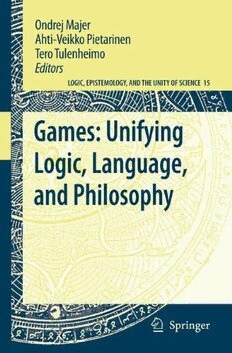
Games: Unifying Logic, Language, and Philosophy PDF
Preview Games: Unifying Logic, Language, and Philosophy
GAMES: UNIFYING LOGIC, LANGUAGE, AND PHILOSOPHY LOGIC,EPISTEMOLOGY,ANDTHEUNITYOFSCIENCE VOLUME 15 Editors ShahidRahman,UniversityofLilleIII,France JohnSymons,UniversityofTexasatElPaso,U.S.A. EditorialBoard JeanPaulvanBendegem,FreeUniversityofBrussels,Belgium JohanvanBenthem,UniversityofAmsterdam,theNetherlands JacquesDubucs,UniversityofParisI-Sorbonne,France AnneFagot-LargeaultCollègedeFrance,France BasvanFraassen,PrincetonUniversity,U.S.A. DovGabbay,King’sCollegeLondon,U.K. JaakkoHintikka,BostonUniversity,U.S.A. KarelLambert,UniversityofCalifornia,Irvine,U.S.A. GrahamPriest,UniversityofMelbourne,Australia GabrielSandu,UniversityofHelsinki,Finland HeinrichWansing,TechnicalUniversityDresden,Germany TimothyWilliamson,OxfordUniversity,U.K. Logic,Epistemology,andtheUnityofScienceaimstoreconsiderthequestionoftheunityof scienceinlightofrecentdevelopmentsinlogic.Atpresent,nosinglelogical,semanticalor methodologicalframeworkdominatesthephilosophyofscience.However,theeditorsofthis seriesbelievethatformaltechniqueslike,forexample,independencefriendlylogic,dialogical logics,multimodallogics,gametheoreticsemanticsandlinearlogics,havethepotentialto castnewlightnobasicissuesinthediscussionoftheunityofscience. Thisseriesprovidesavenuewherephilosophersandlogicianscanapplyspecifictechnical insightstofundamentalphilosophicalproblems.Whiletheseriesisopentoawidevarietyof perspectives,includingthestudyandanalysisofargumentationandthecriticaldiscussionof therelationshipbetweenlogicandthephilosophyofscience,theaimistoprovideanintegrated pictureofthescientificenterpriseinallitsdiversity. Forothertitlespublishedinthisseries,goto www.springer.com/series/6936 Games: Unifying Logic, Language, and Philosophy (cid:69)(cid:100)(cid:105)(cid:116)(cid:101)(cid:100)(cid:32)(cid:98)(cid:121) Ondrej Majer Czech Academy of Sciences, Czech Republic Ahti-Veikko Pietarinen University of Helsinki, Finland Tero Tulenheimo University of Helsinki, Finland ABC (cid:69)(cid:100)(cid:105)(cid:116)(cid:111)(cid:114)(cid:115) Dr. Ondre j Majer Dr. Tero T ulenheimo Academy of Sciences of the University of Helsinki Czech Republic Department of Philosophy Institute of Philosophy Siltavuorenpenger 20 A Jilska 1 FI-00014 Helsinki 110 00 Prague 1 P.O. Box 9 Czech Republic Finland [email protected] [email protected] Dr. Ahti-V eikko Pietarinen University of Helsinki Department of Philosophy Siltavuorenpenger 20 A FI-00014 Helsinki P.O. Box 9 Finland [email protected] Coverimage:AdaptationofaPersianastrolabe(brass,1712–13),fromthecollectionoftheMuseumofthe HistoryofScience,Oxford.Reproducedbypermission. ISBN978-1-4020-9373-9 e-ISBN978-1-4020-9374-6 LibraryofCongressControlNumber:2008938971 AllRightsReserved (cid:176)c 2009 SpringerScience+BusinessMediaB.V. Nopartofthisworkmaybereproduced,storedinaretrievalsystem,ortransmittedinanyformorby any means, electronic,mechanical,photocopying,microfilming,recordingorotherwise,withoutwritten permission from thePublisher,withtheexceptionofanymaterialsuppliedspecificallyforthepurposeofbeingenteredandexecuted onacomputersystem,forexclusiveusebythepurchaserofthework. Printedonacid-freepaper 9 8 7 6 5 4 3 2 1 springer.com Contents Introduction ix Ondrej Majer, Ahti-Veikko Pietarinen, and Tero Tulenheimo Part I Philosophical Issues 1 Why Play Logical Games? 3 Mathieu Marion 2 On the Narrow Epistemology of Game-Theoretic Agents 27 Boudewijn de Bruin 3 Interpretation, Coordination and Conformity 37 Hykel Hosni 4 Fallacies as Cognitive Virtues 57 Dov M. Gabbay and John Woods Part II Game-Theoretic Semantics 5 A Strategic Perspective on IF Games 101 Merlijn Sevenster 6 Towards Evaluation Games for Fuzzy Logics 117 Petr Cintula and Ondrej Majer 7 Games, Quantification and Discourse Structure 139 Robin Clark Part III Dialogues 8 From Games to Dialogues and Back 153 Shahid Rahman and Tero Tulenheimo 9 Revisiting Giles’s Game 209 Christian G. Fermu¨ller v vi Contents 10 Implicit Versus Explicit Knowledge in Dialogical Logic 229 Manuel Rebuschi Part IV Computation and Mathematics 11 In the Beginning Was Game Semantics 249 Giorgi Japaridze 12 The Problem of Determinacy of Infinite Games from an Intuitionistic Point of View 351 Wim Veldman Symbol Index 371 Subject Index 373 Name Index 377 Contributing Authors BoudewijndeBruin DovM.Gabbay FacultyofPhilosophy DepartmentofComputerScience UniversityofGroningen King’sCollegeLondon OudeBoteringestraat 52 TheStrand 9712GLGroningen LondonWC2R2LS TheNetherlands England [email protected] UK [email protected] PetrCintula HykelHosni InstituteofComputerScience ScuolaNormaleSuperiore AcademyofSciences PiazzadeiCavalieri oftheCzechRepublic 56100Pisa PodVodarenskou vezi2 Italy 18207Prague8 [email protected] CzechRepublic [email protected] GiorgiJaparidze DepartmentofComputingSciences RobinClark VillanovaUniversity DepartmentofLinguistics 800LancasterAvenue 619WilliamsHall Villanova,Pennsylvania 19085 UniversityofPennsylvania USA Philadelphia, PA19104-6305 [email protected] USA [email protected] MathieuMarion De´partementdephilosophie ChristianG.Fermu¨ller Universite´ duQue´beca` Montre´al TechnischeUniversita¨tWien Casepostale 8888,succursale Favoritenstr. 9-11/E1852 Centre-ville A-1040Wien Montre´al, Que´bec Austria CanadaH3C3P8 [email protected] [email protected] vii viii Contributing Authors MerlijnSevenster JohnWoods PhilipsResearch DepartmentofPhilosophy Prof.Holstlaan4 UniversityofBritishColumbia 5656AAEindhoven 1866MainMallE370 TheNetherlands Vancouver, BC [email protected] CanadaV6T1Z1 [email protected] ShahidRahman [email protected] U.F.R.dePhilosophie DomaineUniversitaire“PontdeBois” OndrejMajer Universite´ LilleIII Institute ofPhilosophy 59653Villeneuved’Ascq AcademyofSciences France oftheCzechRepublic [email protected] Jilska´ 1,11000Prague ManuelRebuschi CzechRepublic Laboratoire d’Histoire des Sciences [email protected] etdePhilosophie ArchivesHenriPoincare´ Ahti-VeikkoPietarinen UMR7117CNRS-Nancy-Universite´ DepartmentofPhilosophy Universite´ Nancy2 P.O.Box9 23, Bd. Albert Ier-BP 3397. F-54015 00014UniversityofHelsinki NANCYCedex Finland France ahti-veikko.pietarinen@helsinki.fi [email protected] TeroTulenheimo WimVeldman DepartmentofPhilosophy InstituteforMathematics, AcademyofFinland Astrophysics andParticlePhysics P.O.Box9 RadboudUniversityNijmegen 00014UniversityofHelsinki P.O.Box9010 Finland 6500GLNijmegen tero.tulenheimo@helsinki.fi TheNetherlands [email protected] Introduction Ondrej Majer, Ahti-Veikko Pietarinen, and Tero Tulenheimo 1 Games and logic in philosophy Recent years have witnessed agrowing interest in the unifying methodolo- gies over what have been perceived as pretty disparate logical ‘systems’, or else merely an assortment of formal and mathematical ‘approaches’ to philo- sophical inquiry. This development has largely been fueled by an increasing dissatisfaction to what has earlier been taken to be a straightforward outcome of ‘logical pluralism’ or ‘methodological diversity’. These phrases appear to reflect the everyday chaos of our academic pursuits rather than any genuine attempt toclarify thegeneral principles underlying themiscellaneous waysin whichlogicappearstous. But the situation is changing. Unity among plurality is emerging in con- temporary studies in logical philosophy and neighbouring disciplines. This is a necessary follow-up to the intensive research into the intricacies of logical systemsandmethodologies performed overtherecentyears. Thepresent booksuggests onesuchpeculiar butveryunrestrained method- ologicalperspectiveoverthefieldoflogicanditsapplications inmathematics, language or computation: games. Anallegory for opposition, cooperation and coordination, gamesarealsoconcrete objectsofformalstudy. As a metaphor for argumentation Aristotle’s Topics and its reincarnations suchasthescholasticArsObligatoriaaresetupasdialogicalduels(Pietarinen, 2003a). Logicsexploiting thisidearesurface inthetwentieth century attempts to clarify the concepts of argument and proof. The game metaphor has re- taineditsstrengthincontemporarytheoriesofcomputation(Pietarinen,2003b, Japaridze,thisvolume),inwhichcomputationisrecastintermsofthesymbio- sisbetweentheComputingSystem(‘Myself’)anditsEnvironment(‘Nature’). Inmathematics, thebenefitsofdoing sowerenoteddecades agobyStanislaw Ulam(1960),whowrotehowamusingitis“toconsiderhowonecan‘gamize’ ix
